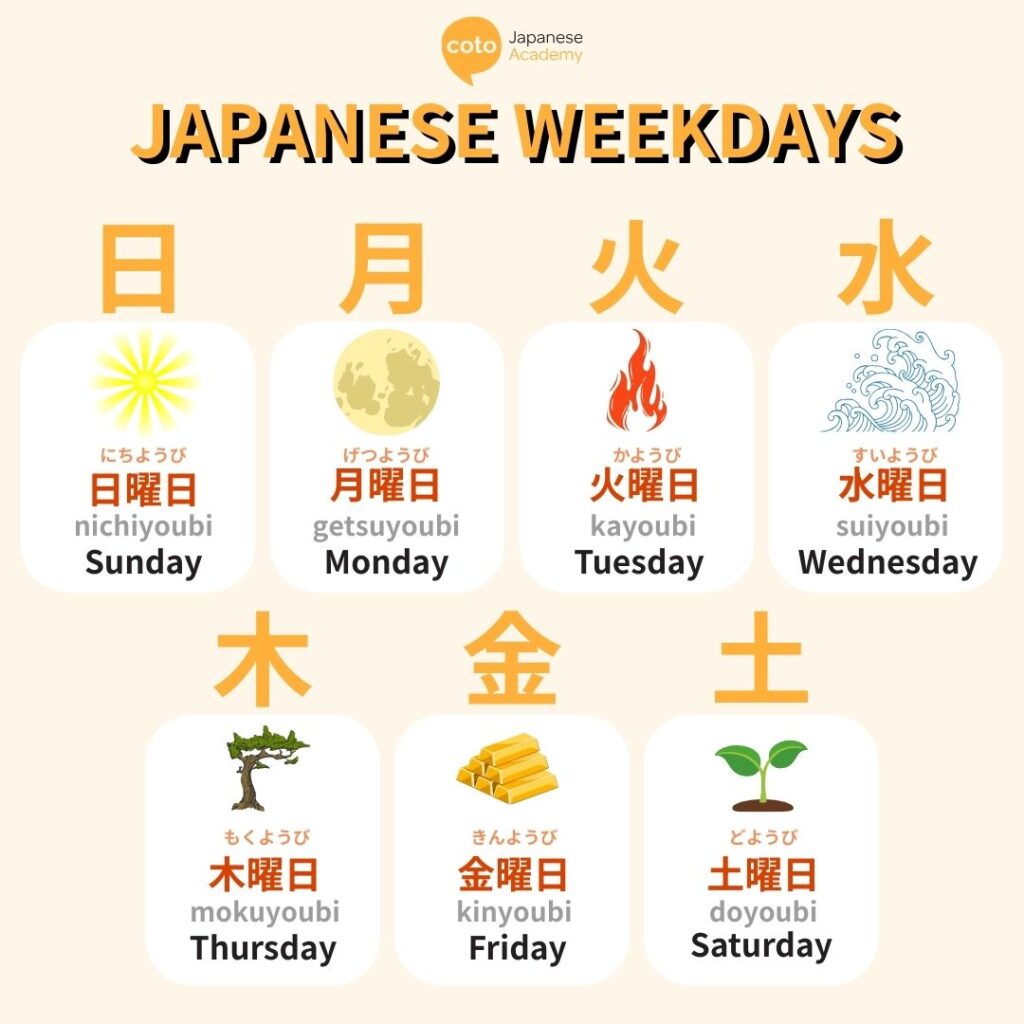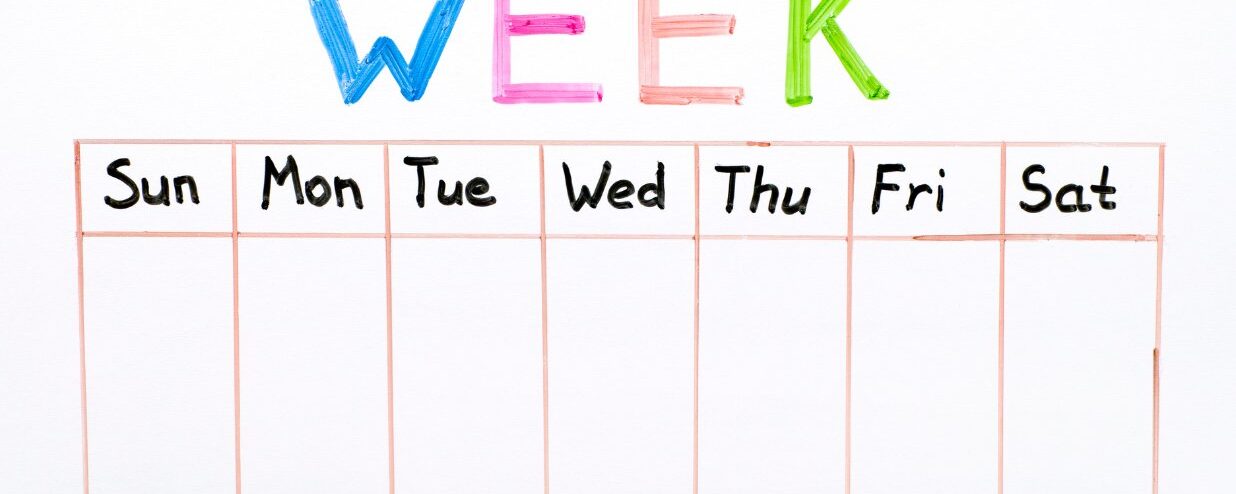How do you say Monday to Sunday in Japan? Knowing the days of the week in Japanese is one of the essential skills you need to have for everyday communication. Once you know them, along with days and months, you’ll find it much easier to make plans with your friends.
In this guide, we’ll introduce each day of the week with its Japanese name, pronunciation, and useful tips to help you remember them quickly. Let’s get started!
Basics of days in Japanese: 曜日 (Youbi)
Just like how each day of the week from Monday to Sunday ends with “day” in English, it is essentially the same in Japanese. Each day of the week ends with the word 曜日(youbi), which roughly means “day” but is specifically used for the weekdays.
Note that although it’s spelled youbi, the first syllable isn’t pronounced like the English word “you.” In Japanese, it’s pronounced yo (as in “yo-yo”), followed by u (as in “oops”) and bi (like “bee”). This follows Japanese pronunciation rules and the concept of long vowels, not English phonetics.
Breaking down the characters, 曜 (you) means a celestial body, such as a planet, moon, or star, and 日 (bi) simply means “day”. The terms for the days of the week have their origins in ancient China, which associated each weekday with mythological beliefs in the celestial bodies.
According to ancient Chinese astrology and mythology, there are five celestial bodies: fire, water, tree, gold/metal, and earth. Additionally, there is the moon and the sun. These concepts were brought to Japan, where they merged with local mythology to form the weekday names still used today. See how each day’s name relates to specific stars and planets.
Days of the Week in Japanese
The days of the week are quite simple. All you have to do is add one of the names of the weekday before 曜日 (youbi). Below is an infographic showing each day of the week along with the literal meaning of weekday to help make it easier to remember.

Here is each weekday in a table as well, showing each word in English, kanji, hiragana, and romaji for your convenience:
| English | Japanese | Hiragana | Romaji |
| Monday | 月曜日 | げつようび | getsuyoubi |
| Tuesday | 火曜日 | かようび | kayoubi |
| Wednesday | 水曜日 | すいようび | suiyoubi |
| Thursday | 木曜日 | もくようび | mokuyoubi |
| Friday | 金曜日 | きんようび | kin youbi |
| Saturday | 土曜日 | どようび | doyoubi |
| Sunday | 日曜日 | にちようび | nichi youbi |
Breaking down each Japanese weekdays
So, let’s take a look at each name of the weekday in Japanese, breaking down the literal translation as well as the actual name of the weekday. We will explore the traditional meanings of each weekday and their origins in Japanese astrology. This will not only help you remember each day of the week, but perhaps will give you a peek into Japan’s rich history with ancient China.
Let’s look at each Japanese weekday name, breaking down both the literal meaning and the modern-day term. We’ll also explore the traditional origins of these names in Japanese astrology. This will not only help you remember the days of the week more easily but also give you a glimpse into Japan’s deep historical ties with ancient China
1. Monday: 月曜日(Getsuyoubi)
月曜日 (getsuyoubi) literally means ‘moon day’ since the character 月 (getsu) translates to moon. Somehow, like in many countries halfway across the world, ancient China, Japan, and Korea associated Monday with the moon.
2. Tuesday: 火曜日(Kayoubi)
火曜日 (kayoubi) means ‘fire day’ as the character 火 (ka or hi) literally means fire. However, the word kayoubi actually refers to Mars, which was called the fire star in ancient China due to its red color.
3. Wednesday: 水曜日(Suiyoubi)
水曜日 (sui youbi) means ‘water day’ with the character 水 (sui or mizu) meaning water. But in the context of weekdays, suiyoubi refers to Mercury, or the water star in ancient Chinese.
4. Thursday: 木曜日 (Mokuyoubi)
木曜日 (moku youbi) means ‘tree day’ with the character 木 (moku or ki) meaning tree. However, mokuyoubi refers to Jupiter, which was called the wood star in ancient Chinese since the color resembled wood.
5. Friday: 金曜日 (Kinyoubi)
金曜日 (kinyoubi) literally translates to ‘gold day’, referring to Venus, which was thought to resemble metal. The character 金 (kin) can translate to gold, metal, or even money.
6. Saturday: 土曜日 (Doyoubi)
土曜日 (do youbi) just means ‘earth day’ with the character 土 (do or tsuchi) meaning earth or soil. However, in ancient Chinese, the word doyoubi is interpreted as earth star. This is associated with Saturn, which has a color resembling soil.
7. Sunday: 日曜日 (Nichiyoubi)
日曜日 (nichiyoubi) means the same as its English name, ‘sun day’. The character, 日 (nichi, hi, or bi), means‘sun’. In Japan, nichiyoubi actually has roots with the sun goddess, Amataresu, from the Japanese folk religion Shinto.
Now that we know how to say the weekdays, how do we express week durations and sequences of events? There will be times when you will need to specify a certain time in week durations such as “this week”, “a week ago”, or “in two weeks”. What are they?
The word for week in Japanese is 週 (shuu), which is hardly used alone and often attached to other words to express week durations or sequences in different situations.
Before we dive into some key vocabulary, let’s discuss the grammar you need to know.
Saying week durations in Japanese
If you understand numbers and counting in Japanese, counting weeks will be relatively straightforward, since it works the same way. You just need to add a number to 週 (shuu) and 間 (kan) to transform the expression for counting the number of weeks, such as one week or two weeks.
The structure for counting week durations is as follows:
Number + 週間 (shuukan)
Here is a table for counting the durations of weeks from 1 to 10:
| English | Japanese | Hiragana | Romaji |
| 1 week | 1週間 | いっしゅうかん | ishhoukan |
| 2 weeks | 2週間 | にしゅうかん | nishuukan |
| 3 weeks | 3週間 | さんしゅうかん | sanshuukan |
| 4 weeks | 4週間 | よんしゅうかん | yonshuukan |
| 5 weeks | 5週間 | ごしゅうかん | goshuukan |
| 6 weeks | 6週間 | ろくしゅうかん | rokushuukan |
| 7 weeks | 7週間 | ななしゅうかん | nanashuukan |
| 8 weeks | 8週間 | はちしゅうかん | hachishuuhan |
| 9 weeks | 9週間 | きゅうしゅうかん | kyuushuukan |
| 10 weeks | 10週間 | じゅうかかん | juushuukan |
Note that ichi (1) conjugates into isshuu kan and not ichishuu kan. You might also notice that 7 weeks is pronounced nanashuukan. This is called rendaku (sequential voicing) or consonant changes due to euphonic reasons.
Expressing weekdays and weekends
Most Japanese public services and businesses will have different hours depending on whether it’s a weekday or a weekend. When asking the staff, on a bus timetable, or board with operating hours, these are the terms that are generally used:
| English | Japanese | Furigana | Romaji |
| Weekday/working day | 平日 | へいじつ | heijitsu |
| Weekend | 週末 | しゅうまつ | shuumatsu |
| Weekend (Saturday and sunday) | 土日 | どにち | donichi |
| Public Holiday | 祝日 | しゅくじつ | shukujitsu |
Key vocabulary for day-related timeframes and frequencies
How can you express weeks in relative time sequences (past, present, and future)? There will be times when you will need to specify this week or next week when scheduling. Here is some key vocabulary to remember:
| English | Japanese | Furigana | Romaji |
| Last week | 先週 | せんしゅう | senshuu |
| This week | 今週 | こんしゅう | konshuu |
| Next Week | 来週 | らいしゅう | raishuu |
| A week ago | 1週間前 | いっしゅうかんまえ | isshuukamae |
| A week later | 1週間後 | いっしゅうかんご | ishuukan go |
| Every week | 毎週 | まいしゅう | maishuu |
Tie everything together to schedule or make a reservation by not only specifying the week but also the time with our guide on how to tell time in Japanese.
Using them in sentences
We’ve learned the basic days of the week in Japanese, from Monday to Sunday, along with related vocabulary. But in real life, you won’t just say the day names alone—you’ll need to use them in sentences, such as when asking questions, making plans, or giving answers.
Let’s take a look at some common phrases using the days of the week.
Talking about the days or week in Japanese
今日は火曜日です。
Kyou wa kayoubi desu.
Today is Tuesday.
明日は水曜日です。
Ashita wa suiyoubi desu.
Tomorrow is Wednesday.
来週の月曜日は祝日です。
Raishuu no nichiyoubi wa shukujitsu desu.
平日は仕事がある。
Heijitsu wa shigoto ga aru.
I have work on the weekdays.
Asking about the day or week in Japanese
週末、予定がありますか。
Shuumatsu, yotei ga arimasu ka.
Do you have plans on the weekend?
明日は何曜日ですか。
Ashita wa nanyoubi desu ka.
What day is tomorrow?
昨日、何をしていましたか。
Kinou, nani o shite imashita ka.
What were you doing yesterday?
Conclusion: Wrapping Up The Week
Mastering the days of the week in Japanese is more than just memorizing vocabulary. It’s a key skill for daily communication, planning, and understanding Japanese culture.
Of course, being able to schedule and make reservations in Japan takes practice. If you want to speak Japanese fluently, consider starting at a top language school like Coto Academy. At Coto, you’ll gradually ease into both the Japanese language and culture, learning real Japanese as it’s spoken in everyday life.
You can choose from part-time or intensive courses across our four campuses in Tokyo and Yokohama, or join our interactive online lessons to learn from anywhere. Our small classes (only 8 students) ensure plenty of speaking practice and personalized attention.
Ready to start? Fill out the form below for a free level check or consultation to find the best learning path for you!
FAQ
How do you say “day of the week” in Japanese?
You say 曜日 (youbi), which literally means “day of the week.” For example, 月曜日 (getsuyoubi) means “Monday.”
Do Japanese people use abbreviations for days of the week?
Yes! On calendars, days are often shortened to just the first kanji, like 月 (Mon), 火 (Tue), 水 (Wed), 木 (Thu), 金 (Fri), 土 (Sat), and 日 (Sun).
Is Sunday or Monday the start of the week in Japan?
In most Japanese calendars, Sunday (日曜日) appears first. However, in business contexts, Monday (月曜日) is often treated as the start of the week.
What are the seven days a week in Japanese?
Monday: 月曜日 (げつようび, getsuyoubi)
Tuesday: 火曜日 (かようび, kayoubi)
Wednesday: 水曜日 (すいようび, suiyoubi)
Thursday: 木曜日 (もくようび, mokuyoubi)
Friday: 金曜日 (きんようび, kinyoubi)
Saturday: 土曜日 (どようび, doyoubi)
Sunday: 日曜日 (にちようび, nichiyoubi)
Want to learn more basic Japanese? Read our guide on:
